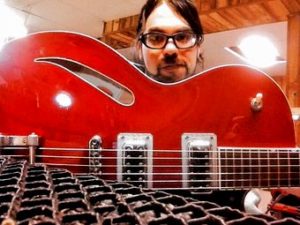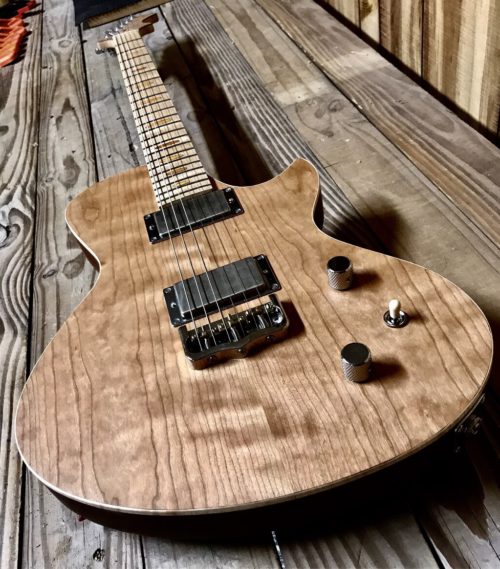Music has always been my thing. Before walking and talking I was banging on pots and pans. For my 10th birthday those pans turned into a drum set. When my drumming skills peeked two years later, I was booted from the eighth grade band and that’s when I picked up a guitar. I taught myself the cowboy chords and started to enjoy writing original songs. My deep appreciation for harmonies, rhythm and melodies only grew stronger throughout high school and college with each new band I discovered. I even hosted a radio show in college called “The Hump Day Happy Hour” where mixed classics like Led Zeppelin and Otis Redding with contemporary talents like Dr. Dog and Jenny Lewis. Believing radio was the avenue to lead me to a career in music, I was sadly mistaken after ending up as a part time board operator for a sports broadcasting station after graduating in 2008. I bounced around from job to job until I eventually ended up selling credit insurance for the man. The pay was great and people were cool but cube life just wasn’t for me.
When I found out there was a school that taught guitar construction and repair, I knew. I remember the exact moment. It was like being struck by lighting. Like the light bulb turned on. Luthiery was going to be the perfect career. Hanging out with rockstars. Jamming on 59′ Les Pauls. Listening to music all day long. I was drunk on the romance of the dream. So, at 24, I took the plunge and dove head first into the deep end of the guitar building swimming pool. How hard could it be, right?? Seven years after graduating, working for one of the worlds top manufactures and starting my own business I can say with confidence, It’s quite a challenge. Here’s why.
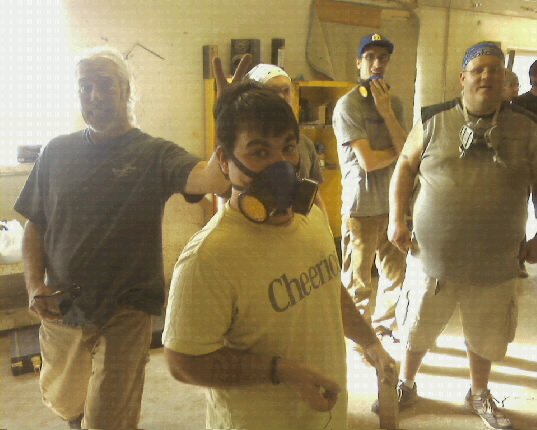
Money
I hate to admit this but seldom a fortune is made fixing and building instruments. It’s a labor of love. People that feel driven to do this kind of work are motivated to do so because of satisfaction they receive from work they feel they need to be doing. Like it’s their purpose. I understand the concept more after loosing money on the first 20 I’ve built and still rolling. It’s no longer about making the most money. It’s about doing the best work.
Even with repair work, the potential earnings are not enough to provide a consistent income enough to cover the cost of monthly living expenses. When I started my independent shop 5 years ago, I figured if I could swing two set ups a day at $50 a pop + miscellaneous repairs I can make this work. Still those numbers add up and but there are just not that many players looking to invest that kind of scratch on their guitars. Some repairs cost more then the value of the instrument being worked on. Finding a someone who appreciates as in need of the skills I offer is like trying to find love in a mosh pit.
If I’m doing my job correctly, I may only see one of my regular customers once or twice a year. Sometimes less. I’m in the business of quality and that means offering repairs that last. For example, a bridge re glue or swapping a potentiometer should only have to be done once. A lot of players have a pretty good understanding of the maintenance side of things and the internet offers a ton of approachable guitar DIY info for home tinkerers. This is great but I also think it’s slowly chiseling away the glory days of the repair guy. Stringing a guitar is a lot easier with video tutorials, articles and gadgets. And let me tell you there are lots of gadgets.

Tools
The first couple years I put every dollar made back into the business. No two instruments are alike and for someone offering professional services, I have to be prepared for whatever comes across the bench. It takes the right tool to do the job and sometimes I eat the cost. Over time that tool slowly starts to become useful. Early on I recall an 80’s super strat come across the bench for a set up. The bi-flex truss rod was stripped so I bought a tapered allen wrench to set the neck relief. The tool + shipping cost $50 and that’s about what I charged for the work. That wrench sat around for months but when I needed it for a second, third and forth stripped rod I was sure glad to have it handy. If you’re thinking about going full steam ahead on repairs hide your piggy bank. The StewMac monster is coming to eat up a small percentage of the first few years revenue.
As far as building guitars goes the amount of machines needed can feel endless. Do the best you can with what you have and if you’re serious about setting up a shop, start saving now. Or make friends with someone who has a lot of machines. Quality milling machines and saws costs thousands. I don’t even owe some of the big ones. Luthiery is extremely fine wood fine woodworking. Think of all the tools you would find in a professional cabinet makers shop but add mechanical engineering into the mix and multiply that by music and art class. That’s instrument making. There is always a tool, gadget, clamp, doodad, thing-a-ma-jig or gizmo somewhere on the horizon that will make things smoother, straighter, faster and cleaner.
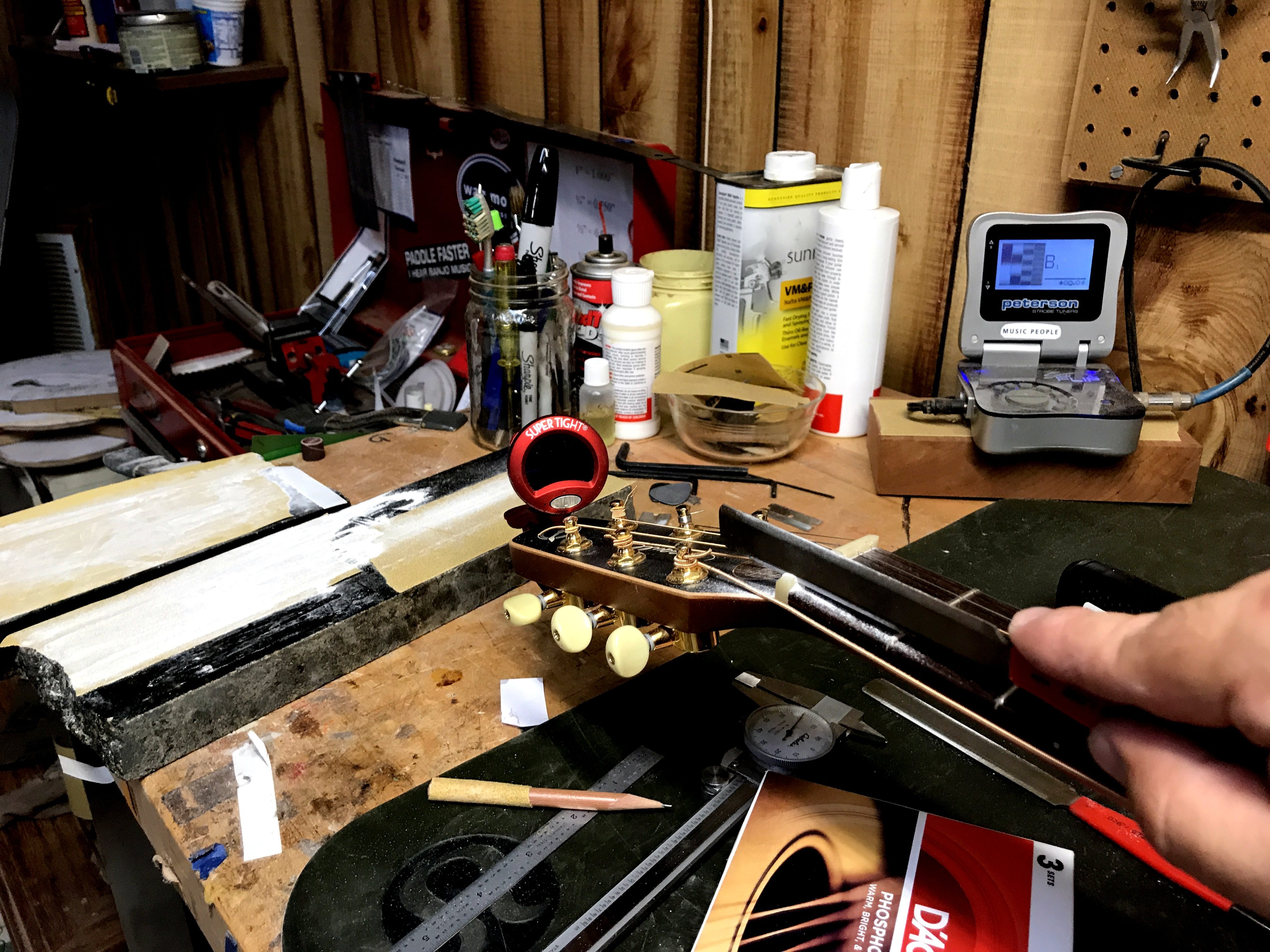
Health
Between the sawdust and super glue and solder fumes some days I leave the shop feeling a bit of a haze. Even if a space is clean there could be itty bitty micron sized dust particles floating through the air. Small enough to where your eyes can’t see them but just big enough to become lodged in a lung. (Remind me to add air filter to the list of tools to buy.) It’s a dirty job but the wood shop is fun. I’d much rather spend my days covered in sawdust getting things done then sitting in meetings taking about getting things done.
If you’re drawn to the wood shop that most likely a symptom of the urge to make something by hand. My hands are how I make a living. They play the strings. They build the boxes and they type the blogs. Unfortunately there are a few fellas doing this who are missing digits from joiners and table saws. That’s part of the trade. Safety first but accidents happen. It’s especially one of those cruel, ironic, everything that you love slowly kills you kind of occurrences. Once the sawdust gets in your veins (and lungs) a little trip to the emergency room won’t keep anyone from creating.
You’ve got to have strong hands to sand, carve, cut, plane, inlay and fret. Consider nipping and filing tiny 24 tiny bars of metal. Hammering them in place. Leveling. Then dressing all 48 ends. They all must look exactly the same too. Do that a few times a week and your paws will be barking. The condition of my hands is directly related to the amount of money in my checking account. My hands have been cut, poked, sliced and drenched in super thin super glue. Remind me to treat myself to a manicure next payday.
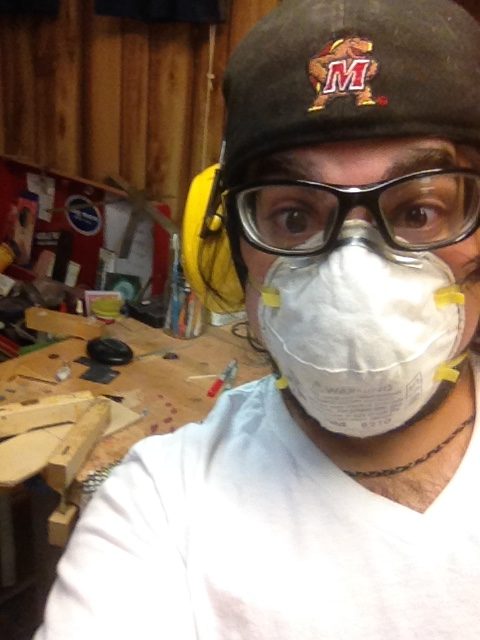
Competition
If it was easy, everyone would do it. The funny thing about this profession is it’s not easy but there are a lot of people getting in the mix. Before starting out, I didn’t considered the amount of competition in my area (Baltimore/DC Metro). I thought there was one or two independent guys and a few music shops but nope. It’s crowded and there is a new person everyday throwing their name into the repair pot. I made the very easy decision a few yeas ago to be grateful for and focus on the work I have. There’s is plenty of work to go around and almost every guitar I see could use a little love. After speaking with other independent shops, a lot of people got their start working at someone else shop then quitting and taking half of the customers with them. It happens all the time.
For builders, the market is saturated with talented people willing to build you the guitar of your dreams but not enough players in a position to own a handcrafted instrument. The great thing about a saturated market however means increased innovation and pushing design ideas. There are some beauties out there right now. I’m continually impressed and inspired everyday. More boutique builders more options to that rare and discerning player. For a vast majority, the mouse trap has been built. It doesn’t get much better then a black guard Tele or sunburst Les Paul. Add tubes, gain and volume. Bliss.
Pressure
High school never stops, right? Couldn’t be more true. It’s all about reputation in business and at times being a luthier can feel a lot like being back in the high school cafeteria. There are cliques and nerds, bullies, back stabbing, ass kissing and gossip. It’s a bit of a popularity contest and lots of names are dropped. Every job is either an opportunity to gain new customers or tarnish my reputation. There will be judgement no matter what and the opinion that matters most to me at the end of the day is the one I have of myself.
There is no road map for some of this stuff. Building, I have a recipe to follow but some repairs, I’m flying by the seat of my shop stool with epoxy in one hand and a template in the other. There’s a lot of pressure working on someone else’s stuff. Repairing often means stepping outside my comfort zone complete the work. Luthiery is very much an art form but the goal is to not have my work to stand out. I want my work to look like it never happened. Depending on the job that’s not always the easiest task to accomplish. As a builder I want the instrument to look like it fell from the sky. Seamless with a beautiful fit and finish.
Sometimes people expect me to be an all encompassing atlas of guitar history and musical knowledge. I know a thing or two about a string or two but I know more about wood, glues, strength to weight ratio, tools, router bits, finish work, the plane of a fingerboard while under sting tension and a butt load about screws but I can’t tell you if a bolt on is better then a set neck. That’s what the forums are for. Most of those conversations are matter a opinion. Doing the best work I can that’s a matter of fact.
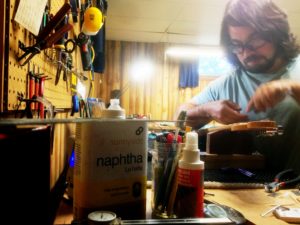
Pursuing a dream is not easy. It’s a constant balance of taking care of customers, preforming quality work, cleaning up the shop, keeping a close watch checking account and in general making sure everyone is happy, happy, happy. After spending hours at the bench filing fret ends sometimes I have to remind myself of that day when the lutherie light bulb turned on. At that moment I felt as if I had knew everything without having gone through it yet. Looking back it’s not the perfect career but I know more now having gone through the experience then I ever would have if I had not answered the call.
There’s an inherent balance that lies within the universe. Work a job that you’re not quite into and be rewarded with a steady income and benefits. Pursue a craft, art, passion, sport, goal, work really hard and maybe just maybe the efforts will pay off just enough to keep food in your belly and gas in your tank. There are no guarantees on both sides of the fence. Even if the grass starts to look greener, know it’s just as hard to mow. -SB
